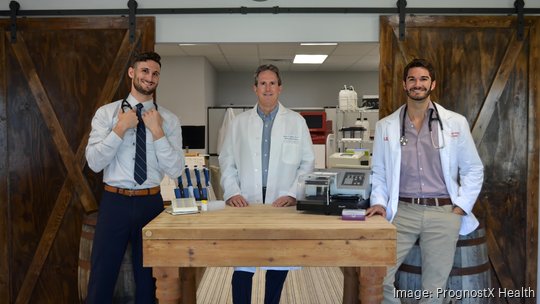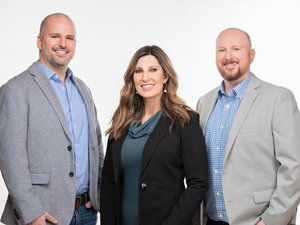
In most cases, a startup can only be as successful as the time in which it is released to address a pain point in a particular market.
Gifted with a long runway paved by years of related research, a father-son duo based out of the Louisville metro area is hoping that their biotech startup, PrognostX Health, will have ideal flying conditions, so to speak, in the upcoming months.
That’s because founder Stephen Carrithers (a scientific doctor) and his son Dr. Aaron Carrithers (a medical one) are preparing to launch a rapid, single-assessment test for chronic kidney disease (CKD) — in the wake of a new drug developed by AstraZeneca, dapagliflozin (brand name of Farxiga), receiving clearance from the U.S. Food and Drug Administration in April 2021.
In addition, a second medication, empagliflozin (brand name of Jardiance) is also on a fast track for approval by the FDA after being developed by Eli Lilly and Boehringer Ingelheim. Both work as oral sodium-glucose cotransporter 2 (SGLT2) inhibitors, which prevent reabsorption of glucose in the kidney. Both drugs were initially approved to treat Type 2 diabetes.
According to the National Institute of Diabetes and Digestive and Kidney Diseases, there are an estimated 37 million people in the U.S. who have CKD, which in addition to lessening the kidney’s function, can increase the possibility of stroke and heart disease — and require a patient to go on dialysis or have a kidney transplant.
Before the approvals, the only forms of treatment came through lifestyle changes and dietary recommendations, remedies that are often not followed by patients.
“Before 2021, having a clinical diagnostic like ours that was a single assessment … really wasn’t relevant,” said Stephen, who serves as the company's president and CEO. “And then a therapy came out and all of a sudden, we are relevant, and so we have made that push.”
In addition, Aaron said that there has been a recent uptick in CKD, one that has possible ties to the Covid-19 infections, which have been shown to increase the rate of acute kidney injuries — one of the major predisposing factors. That being said, maladies like CKD tend to be “multi-factorial,” Stephen said.
The Carritherses have an article coming out later this week on their findings in the journal Scientia Global by the name of “A New Test to Identify Chronic Kidney Disease — A Costly and Silent Killer."
How it works
The test works by taking a few drops of blood and using the enzyme-linked immunosorbent assay (ELISA), which is done in “99% of all hospitals, and laboratory diagnostic reference laboratories,” in the words of Stephen.
The test singles out the presence of a biomarker protein in the blood called serum creatinine, which is secreted by the kidney to alert the body that it is not functioning properly. The test has an accuracy level of about 96%, which is about 70% more accurate than the current standard of care, Stephen said.
“We built a test framed around the current standard of care,” he said. “The difference is we get an answer in a couple of hours … We like to say ‘One test, one answer. Treat if positive,’ so it’s a simple yes/no.”
Under the current standard of care, using what is called the estimated glomerular filtration rate (eGFR), the test result is determined at the rate that serum creatinine can filter through the kidneys to determine how fast they are filtering your blood of toxins and other “negative material” found in the bloodstream, according to Aaron. That rate, coupled with a patient’s age, race and gender creates a number that is supposed to be close to the measured glomerular filtration rate (GFR).
“Creatine is not incredibly specific to the kidneys as it comes from the muscle — and so the [eGFR] often overestimates what the measured GFR is, so that leaves a number of patients undiagnosed,” said Aaron, who serves as the company's chief medical officer.
The eGFR test has to have two positive tests within 90 to 120 days of each other, but approximately 60% of patients who receive an initial low eGFR score do not come back for their second round of required testing “because CKD is asymptomatic until the very, very last stages,” Aaron said.
“The problem with CKD is once you find out, you have it, it’s generally irreversible,” Stephen said. “It’s a subtle, underlying hidden disease until, boom, you’re diagnosed — and the problem with diagnosis is it takes three months to a year to get diagnosed.”
Ready for launch
PrognostX Health was founded in 2020 originally as Am Dx PrognostX before it began doing business under its current name in January 2021.
The company, which has six employees, formed through taking part in the Launch Blue accelerator in 2021 at the University of Kentucky, allowing Stephen to put all of his 20-plus years of research, technology creation and commercialization efforts centered around chronic diseases under one roof. He began his journey as an assistant professor of UK’s School of Medicine from 1996 to 2004.
The operation — which also involves Stephen’s other son, Dr. Brennan Carrithers, who is a resident physician at New York University, in a part-time role — initially focused on research related to diabetes. PrognostX Health also has developed a similar test for prediabetes.
The rapid CKD test should be available within nine to 12 months, according to Stephen, depending on several factors, such as implementation into Medicare and Medicaid services and reimbursements.
Aaron, though, said a launch could take place as early as six months, depending on how quickly the company can reach the $5.3 million it is seeking in its current Series A round, which began in February. Since 2010, Stephen and his team have been able to garner approximately $12.1 million in grant and/or other non-dilutive funding from various sources such as the National Institute of Health (NIH), the Kentucky Science & Technology Corporation (KSTC) and the Kentucky Cabinet of Economic Development.
In February 2022, we reported the company was one of nine companies who received a collective $900,000 in state matching grants through the state's Small Business Innovation Research (SBIR) and Small Business Technology Transfer (STTR) Matching Funds Program. That following March, we reported it received more than $263,000 in grant money from the NIH in 2021.
Stephen added that a majority of PrognostX Health has been self-funded through royalties from previous products and clinical diagnostics and therapeutics.
Stephen said his company’s top goal is to form partnerships with strategic partners, such as pharmaceutical companies and “larger diagnostic reference laboratories.” Recently, the startup reached a deal with Q2 Solutions for sponsorship of a “real-world evidence clinical trial” in which Q2 will recruit the patients. The company also signed a marketing and distribution contract for its "research-use only" kits with Ethos Biosciences.
Eventually, the company’s end goal is to make all of its tests of the at-home variety, similar to the rapid, at-home Covid tests, Stephen said.
“We want to break that mold,” he said. “I feel like you can expedite the process because the way I've developed the antibodies, is that they can be formulated in a device just as simple as a lateral flow device [used for testing for Covid].”









